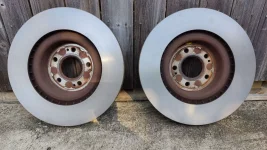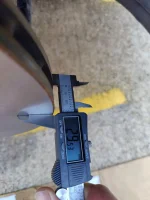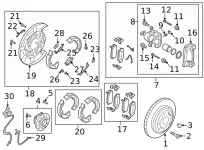orange260z
SUSTAINING MEMBER
- Joined
- Oct 30, 2023
- Messages
- 119
- Reaction score
- 76
- Points
- 28
- Location
- Ottawa, Great White North
- Genesis Model Year
- 2023
- Genesis Model Type
- Genesis G70
@lobewiper1 , I'm going to qualify my comments to follow by noting that I do not know how a shift-by-wire/park-by-wire system works, and am assuming that mechanically they are still the same as the old mechanical versions.Great info regarding moisture brake fluid. As mine is 6 years old now, it's definitely due! As for changing rear pads, I just made sure the parking brakes were not engaged and the rear rotors came right off. As I never use the parking brake, my parking brake shoes were like new and did not need adjusting or replacing.
I'd highly recommend making a habit of regularly using the parking brake for a couple of reasons:
(1) use it or lose it - unless it's used somewhat regularly, things tend to seize up and the brake may not be functioning when you need it; and
(2) usage reduces wear/damage to your automatic transmission's "parking pawl" that locks the transmission when you put it into park.
Ever put a transmission into "park" on a slope and have to put extra effort into shifting it out? That's because the weight of the vehicle is being supported by the parking pawl (pin), which isn't really what it's designed for. Even the mild slope on your driveway causes extra wear to your transmission that can be avoided by use of the parking brake. On a steep slope or just from repeated use on mild slopes this can cause significant damage to an automatic transmission.
Now I'm, not 100% sure if this car automatically engages the parking brake when P is pressed, but I don't think so.
In my family we've made it a habit to engage the parking brake every time we park a car, that way it just becomes natural. I come to a stop, and engage the parking brake before removing my foot from the brake. I let the car rest onto the parking brake, then shift into Park. That way the transmission is completely unloaded. I do this in our manual and automatic transmission cars for consistency.
One of my biggest peeves with my new G70 is that the parking brake automatically releases if you shift from Neutral into R or D; even after a few months I occasionally find myself shifting the car into R after I've already engaged the brake and pressed P, just out of ~37 year habit and switching between cars with normal shifters.










